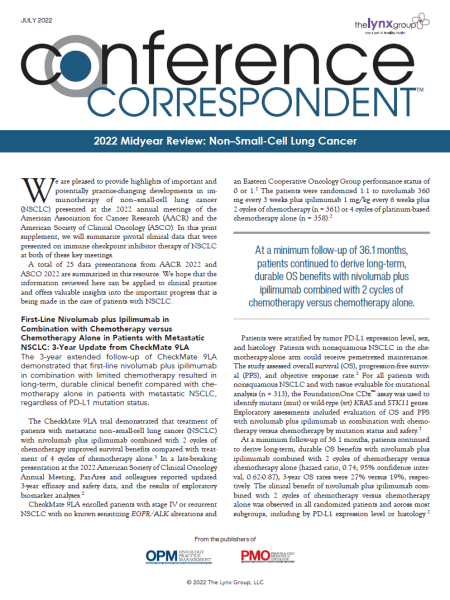Long-term follow-up of cohort G of KEYNOTE-021 validates PFS benefits for pembrolizumab combined with pemetrexed plus carboplatin compared with pemetrexed plus carboplatin alone in nonsquamous NSCLC.
Cohort G of the KEYNOTE-021 study compared the efficacy and safety of pembrolizumab (Keytruda) combined with pemetrexed plus carboplatin with the use of pemetrexed plus carboplatin as first-line therapy for patients with advanced nonsquamous NSCLC with no targetable EGFR mutations or ALK translocations.1 The primary data analysis showed that pembrolizumab significantly improved ORR and PFS compared with pemetrexed plus carboplatin alone (ORR, 55% vs 29%; median PFS, 13.0 months vs 8.9 months).1 On the basis of this primary analysis from KEYNOTE-021 cohort G, pembrolizumab in combination with pemetrexed plus carboplatin was granted accelerated approval for this indication by the US Food and Drug Administration.2
Researchers recently reported findings from an extended analysis from KEYNOTE-021 Cohort G with approximately 36 additional months of follow-up from the primary analysis, including patients who completed 2 years of pembrolizumab treatment.2 A total of 123 patients with previously untreated stage IIIB/IV nonsquamous NSCLC without EGFR or ALK aberrations were randomized 1:1 to 4 cycles of pemetrexed plus carboplatin with or without pembrolizumab (200 mg every 3 weeks).2 Pembrolizumab treatment continued for 2 years, and maintenance pemetrexed was permitted in both groups. Eligible patients in the pemetrexed plus carboplatin-alone group who experienced radiologic progression were allowed to cross over to pembrolizumab monotherapy. P values are nominal (1-sided P <.025).2
At the time of data cutoff (August 19, 2019), median time from randomization was 49.4 months (range, 43.5-55.4).2 The ORR was higher with pembrolizumab plus pemetrexed plus carboplatin (58%) versus pemetrexed plus carboplatin alone (33%).2 Compared with the previous analysis, 3 additional patients achieved complete response in the pembrolizumab plus pemetrexed plus carboplatin arm, and 2 additional patients achieved objective responses in the chemotherapy-alone arm.2
As of August 2019, median duration of response was 36.3 months with pembrolizumab plus pemetrexed plus carboplatin and 22.8 months with chemotherapy alone.2 Estimated rates of continued response at 2 years were 71% and 47%, respectively.2 At 3 years, duration of response rates were 51% and 47%, respectively.2 Pembrolizumab combined with pemetrexed plus carboplatin improved median PFS compared with pemetrexed plus carboplatin alone (HR, 0.54; 95% CI, 0.35-0.83).2 The 3-year PFS rates were 37% and 16%, respectively.2
The HR for OS (95% CI) was 0.71 (0.45-1.12).2 The 3-year OS rates were 50% and 37% for pembrolizumab plus pemetrexed plus carboplatin compared with pemetrexed plus carboplatin alone.2 PFS was significantly improved with pembrolizumab plus pemetrexed plus carboplatin versus pemetrexed plus carboplatin alone (HR, 0.53; 95% CI, 0.33-0.86; P = .0049).2 Forty-one patients in the pemetrexed plus carboplatin-alone group received subsequent anti–PD-1 or anti–PD-L1 therapy.2 The HR for OS was 0.56 (95% CI, 0.32-0.95; P = .0151).2 Grade 3 to 5 treatment-related AEs were observed in 41% of patients in the pembrolizumab plus pemetrexed plus carboplatin arm and 27% of patients in the pemetrexed plus carboplatin-alone arm.2
Researchers concluded that this long-term analysis of KEYNOTE-021 cohort G continues to show durable responses, long-term survival benefits, and manageable toxicity for first-line pembrolizumab plus pemetrexed plus carboplatin versus chemotherapy alone, despite the high effective crossover rate, among patients with advanced nonsquamous NSCLC without EGFR or ALK alterations regardless of PD-L1 status.
References
1. Langer CJ, Gadgeel SM, Borghaei H, et al; for the KEYNOTE-021 investigators. Carboplatin and pemetrexed with or without pembrolizumab for advanced, non-squamous non-small-cell lung cancer: a randomized, phase 2 cohort of the open-label KEYNOTE-021 study. Lancet Oncol. 2016;17:1497-1508.
2. Awad MM, Gadgeel SM, Borhaei H, et al. Long-term overall survival from KEYNOTE-021 cohort G: pemetrexed and carboplatin with or without pembrolizumab as first-line therapy for advanced nonsquamous NSCLC. J Thorac Oncol. 2020 Oct 15. Epub ahead of print.

